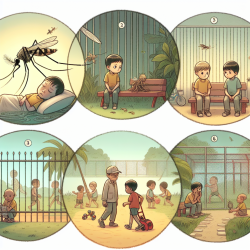Cerebral malaria is a severe form of malaria that can have devastating effects on children. Recent research has highlighted the potential long-term mental health disorders associated with this condition. As practitioners, understanding these impacts is crucial for providing comprehensive care and support to affected children and their families.
The Study: Key Findings
The study titled "Cerebral malaria is associated with long-term mental health disorders: a cross-sectional survey of a long-term cohort" provides valuable insights into the mental health challenges faced by children who have survived cerebral malaria. Conducted at Mulago Hospital in Kampala, Uganda, this research involved 173 children exposed to cerebral malaria and compared them with those suffering from severe malaria anemia (99 children) and community controls (108 children).
The findings revealed that a significant number of children exposed to cerebral malaria developed mental health disorders. The most common disorders observed were externalizing disorders such as conduct disorder, oppositional defiant disorder, and attention deficit hyperactivity disorder (ADHD). These conditions were linked to small vessel ischemic neural injury as evidenced by brain MRI findings.
Implications for Practitioners
Understanding the link between cerebral malaria and long-term mental health issues is vital for practitioners working with affected populations. Here are some key takeaways:
- Early Identification: Practitioners should be vigilant in identifying early signs of behavioral and mental health issues in children who have survived cerebral malaria. Utilizing tools like the Strengths and Difficulties Questionnaire (SDQ) can aid in early detection.
- Comprehensive Care: Providing holistic care that addresses both physical and mental health needs is essential. Collaborating with mental health professionals can ensure that children receive appropriate interventions.
- Family Support: Educating families about the potential long-term effects of cerebral malaria is crucial. Encouraging open communication and providing resources for family support can help in managing these challenges effectively.
- Advocacy for Follow-Up Programs: There is an urgent need for programs that offer follow-up care for children who have experienced cerebral malaria. Practitioners can advocate for such initiatives within their communities and healthcare systems.
Encouraging Further Research
This study underscores the importance of continued research into the long-term effects of cerebral malaria. Practitioners are encouraged to engage in or support further studies that explore effective interventions and preventive measures for mental health disorders resulting from this condition.
Conclusion
Cerebral malaria not only poses immediate life-threatening risks but also has significant long-term implications on children's mental health. By understanding these impacts, practitioners can improve their approach to treatment and provide better support to affected families. As we continue to learn more about this condition, it is imperative to advocate for comprehensive care strategies that address both physical and psychological needs.
To read the original research paper, please follow this link: Cerebral malaria is associated with long-term mental health disorders: a cross-sectional survey of a long-term cohort.










